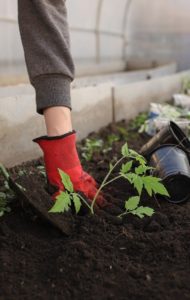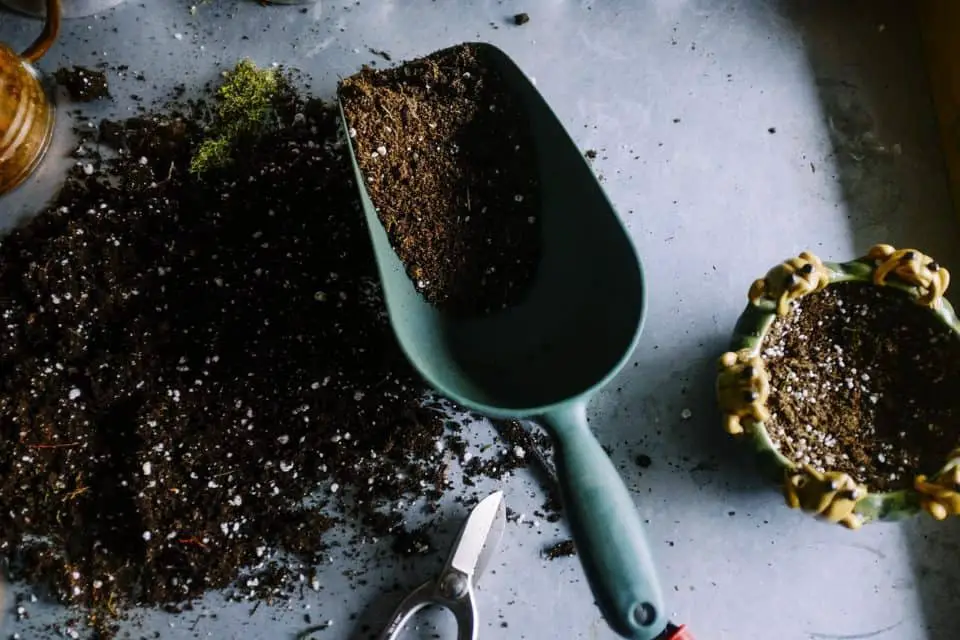Some links in the post are affiliate links and I get a commission from purchases made through some links found in the post.
Having our plants attacked by spider mites can be frustrating, to say the least. They can also be hard to get under control and often we maybe left with a plant that does not look healthy or even dies.
Spider mites are a part of the arachnid group, and they will suck on plants, leaving them susceptible to secondary infections.
These little pests can attack over 180 different species in our gardens. They thrive in dry conditions and are highly prolific. Once an infestation has started it can be difficult to bring it under control.
There are several ways to do this, but one way to handle this is by making use of diatomaceous earth.
What is Diatomaceous Earth?
 This powder substance is made from sediment of fossilized algae. This sediment is found in bodies of water all over the world. Because of the composition of the algae, the sediment is high in silica.
This powder substance is made from sediment of fossilized algae. This sediment is found in bodies of water all over the world. Because of the composition of the algae, the sediment is high in silica.
Diatomaceous earth was also used by the Greeks to produce building materials such as blocks and bricks.
Taken orally diatomaceous earth has good uses, it can be used to treat high cholesterol levels, treat constipation, and generally improve the condition of bones, hair, teeth, nails, and skin.
Diatomaceous earth has further uses such as in industry to filter water. Surprisingly it is even used in some of the food we buy because it prevents the formation of lumps. You will find it in some medicines and paints as well as in cat litter.
You will find this used to clean up industrial spills and in some chemical tests.
And finally..it is used as an insecticide!
How does Diatomaceous Earth Work?
Because the powder contains up to 90% silica it is used to dry out and dehydrate insects and kill them.
It does this by absorbing the fats and oils from the exoskeleton of the insect.
The edges of the powder are sharp and abrasive and this helps to speed up the process. As long as diatomaceous earth is kept dry and undisturbed it will stay effective.
Insects do not have to ingest or eat the powder for it to work because the oils in the bodies are absorbed by the powder and the insect dies.
You may also like: how to use neem oil & does neem oil kill spider mites.
How to use Diatomaceous Earth to Control Spider Mites
Fortunately, diatomaceous earth is not harmful for pets or humans, it is however, lethal for pests like spider mites. Neither will it harm your plants.
The best way to use diatomaceous earth to treat infestations of spider mites is to sprinkle it on the foliage and the soil around an infected plant.
You must be sure that you only use the food-grade version. This will kill spider mites by dehydrating them.
How Long Does it Take Diatomaceous Earth to Kill Mites?
For diatomaceous earth to be effective is to sprinkle it where it is needed and then to leave it alone. For it to work at its best it must not be disturbed.
If you can do this then you will see results within 24 hours. These will become more apparent after about five days.
Does Diatomaceous Earth Kill Spider Mites?
Diatomaceous earth is lethal to spider mites. It works by dehydrating the exoskeletons of the mites and killing them.
This compound is also deadly for several other insects, although it will not harm humans and pets.
What are the Side Effects of Diatomaceous Earth?
If you are unfortunate enough to have sniffed in some of the compound you may experience some irritation to your nasal passages.
A large amount which is inhaled may make you start to cough and leave you short of breath, which is why care should be taken when sprinkling it around plants.
Some people find that the compound irritates their skin and irritates their eyes – again, you should take precautions when you apply it around plants.
You may also like: how to get rid of spider mites on a fiddle leaf fig.
Signs and Symptoms of Exposure to Diatomaceous Earth
While the powder is not harmful to adults and pets, you may notice that you are coughing if you have inhaled large amounts.
Because it is so abrasive, you will find that your eyes are irritated and dry. Any contact to skin can cause irritation and should be washed off as soon as possible.
How to Avoid Exposure
Remember that you are sprinkling a fine dust around your plants and the slightest breeze will cause the dust to blow round. If you or your kids are around the plant, then some dust is going to affect you.
You can avoid exposure to diatomaceous earth by using protective clothing. You should also apply the dust and then leave the area until it has settled.
Keep children and pets away. It is best for only one person to sprinkle the powder and then move away.
After it has settled do not let kids or animals dig around the plants as the dust needs to be undisturbed if it is to work well.
Final Thoughts
 Because spider mites multiply so rapidly an infestation can take hold of your plant in a matter of days.
Because spider mites multiply so rapidly an infestation can take hold of your plant in a matter of days.
Making use of diatomaceous earth to eradicate and prevent further infestations makes a lot of sense, especially when we know that it is highly successful in doing this.
If you plan on using this to treat your plants then be sure to take precautions because while it will not harm you, it may irritate eyes and skin. If you have any respiratory issues you may find yourself out of breath.
Try not to apply the dust on a windy day. Early mornings are best when the air is calm.
Aim for a dry day to sprinkle the dust and make sure you use any protective equipment you need to keep from inhaling the powder.
With the right protective gear and some simple precautions, there is no reason why you cannot have a garden or an indoor plant collection which is free from spider mites.
This is an easy way – and a very successful method – of ridding your plants of spider mites.
If you enjoyed this article, check out our article on how to get rid of gnats in plants using coffee grounds.

